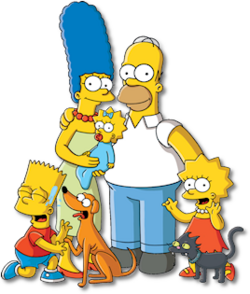
Difference between revisions of "The Simpsons"
(→Reference) |
(→Setting) |
||
| Line 91: | Line 91: | ||
===Setting=== | ===Setting=== | ||
[[File:Springfield panoramic.png|200px|thumb|left|Springfield]] | [[File:Springfield panoramic.png|200px|thumb|left|Springfield]] | ||
| − | The show takes place in the fictional town of [[Springfield]], which was partially based on [[Matt Groening]]'s hometown of [[wikipedia:Portland, Oregon|Portland, Oregon]]<ref>{{cite web|url=http://www.portlandtribune.com/news/story.php?story_id=12392|title=Matt Groening’s Portland|accessdate=2007-08-04|author=Hamilton, Don|date=2002-07-19|publisher=''[[wikipedia:Portland Tribune|Portland Tribune]]''}}</ref>, but according to the producers, it was supposed to represent any town in the United States of America. The [[Springfield's State|state]] that [[Springfield]] is in located is never mentioned in the series, a fact that has become an joke throughout the series.[[David Silverman]] once jokingly claimed that the state was "North Takoma" <ref name="NT">{{cite news|author=Laura Lee Davies |url=http://www.snpp.com/other/interviews/oakley.silverman.html|title=Bill Oakley & David Silverman|publisher=''[[wikipedia:Time Out (company)|Time Out]]''|date=1996-09-25|accessdate=2008-04-28}}</ref>. | + | The show takes place in the fictional town of [[Springfield]], which was partially based on [[Matt Groening]]'s hometown of [[wikipedia:Portland, Oregon|Portland, Oregon]]<ref>{{cite web|url=http://www.portlandtribune.com/news/story.php?story_id=12392|title=Matt Groening’s Portland|accessdate=2007-08-04|author=Hamilton, Don|date=2002-07-19|publisher=''[[wikipedia:Portland Tribune|Portland Tribune]]''}}</ref>, but according to the producers, it was supposed to represent any town in the United States of America. The [[Springfield's State|state]] that [[Springfield]] is in located is never mentioned in the series, a fact that has become an joke throughout the series. [[David Silverman]] once jokingly claimed that the state was "North Takoma" <ref name="NT">{{cite news|author=Laura Lee Davies |url=http://www.snpp.com/other/interviews/oakley.silverman.html|title=Bill Oakley & David Silverman|publisher=''[[wikipedia:Time Out (company)|Time Out]]''|date=1996-09-25|accessdate=2008-04-28}}</ref>. |
==Reference== | ==Reference== | ||
Revision as of 01:19, March 28, 2010

|
This page is under construction.
Please improve the article, or discuss improvements on the talk page. |
The Simpsons
| ||||||||||||||||||||||||||||||||||
TV Show Information
|
The Simpsons is an American animated television sitcom created by Matt Groening and produced by the Fox Broadcasting Company. The main characters is a satire of a working class family, consisting of Homer, Marge, Bart, Lisa and Maggie. The series lampoons many aspects of American culture, society, politics and history.
The cartoon made its debut as 60 second animated bumpers for the The Tracey Ullman Show, with the first short airing on April 19, 1987. The shorts were then expanded into a full length 30 minute television spin-off in 1989 by the FOX Company, and the first episode aired on
The series currently holds the record for the longest running primetime sitcom in the history of television, running for 21 years since 1989, and becoming the longest running program on FOX.
Contents
History
Main Article: History of The Simpsons
The Simpsons were conceived in the lobby of James L. Brooks' office by Matt Groening. He was asked to do a series of animated shorts, and decided to do his Life in Hell series; but since he realized that animating Life in Hell would require the rescinding of publication rights for his life's work, he chose another approach and formulated his version of a dysfunctional family. He named the characters after his own family, and substituted Bart for his own name; as it was an anagram of 'brat'.
The Simpsons first appeared to the world on April 19th, 1987 on The Tracey Ullman Show. Groening submitted crudely drawn sketches of the family to the animators, assuming they would clean them up in production. However, the animators just re-traced over his drawings; that is why the Simpsons appear crudely drawn in the shorts. UK: 20th Century Fox.. In 1989, a team of production companies adapted the Simpsons into a half-hour primetime series, for the FOX Broadcasting Company. FOX was initially nervous to air the Simpsons; as there hasn't been a cartoon in primetime since The Flintstones, and that they were unsure if they could keep the audience's attention for the duration of the episode. They proposed doing three seven-minute shorts and four specials until the audience adjusted, but the producers gambled for thirteen half-hour episodes for the series. The Simpsons was originally to premiere in the fall of 1989; with "Some Enchanted Evening," but when the episode came back from animation in Korea, it had major, major problems with it. James L. Brooks was extremely dissatisfied with the product and called for many parts of the episode to be redone. The producers then decided to just go ahead and air "Simpsons Roasting on an Open Fire," on December 17th, 1989 as a Christmas Special.
Production
Executive Producers
Through the entire show's history, Matt Groening and James L. Brooks have served as the show's executive producers. Sam Simon was also in this position, although not credited. When Simon left in 1993, he arranged a deal to be credited as executive producer as well as get profits even though he no longer works on the show.
Writers
The first team of writers for The Simpsons was assembled by Sam Simon. These were: John Swartzwelder, Jon Vitti, George Meyer, Jeff Martin, Al Jean, Mike Reiss, Jay Kogen and Wallace Wolodarsky. Newer Simpsons writing teams usually have 16 writers and episode ideas are though of and proposed in early December. The main writer writes the first draft and the group changes it, adding in jokes and removing parts they don't like. This can sometimes change a script entirely. Up until 2004, the head of these groups was George Meyer, who apparently wrote a lot of the best lines from episodes.
Voice Actors
Main cast actors
| Dan Castellaneta | Julie Kavner | Nancy Cartwright | Yeardley Smith | Hank Azaria | Harry Shearer |
| 90px | 90px | 100px | 105px | 95px | |
|
Homer Simpson, Grampa Simpson, Barney Gumble, Krusty the Clown, Groundskeeper Willie, Mayor Quimby, Hans Moleman and many others |
Marge Simpson, Patty and Selma |
Bart, Nelson, Ralph, Todd Flanders, others | Lisa | Moe, Chief Wiggum, Apu,Comic Book Guy, Carl,Cletus, Professor Frink, Dr. Nick and many others | Mr. Burns, Smithers, Ned Flanders, Rev. Lovejoy, Kent Brockman, Dr. Hibbert,Lenny, Principal Skinner,Otto, Rainier Wolfcastle and many others. |
Dan Castellaneta and Julie Kavner were already members of "The Tracey Ullman Show". Rather than hire more actors for voices for the Simpsons animated shorts, the producers asked both Castellaneta and Kavner to provide the voices of characters Homer and Marge. Yeardley Smith originally wanted to play the role of Bart, but the producers found her voice too "girlish". Instead, she was given the role of Bart's sister, Lisa Simpson. Bart was voiced by Nancy Cartwright , who originally auditioned for the role of Lisa but decided to be the voice of Bart instead after finding out that Lisa had a lack of personality at the time, while the character of Bart was "devious, underachieving, school-hating, irreverent, and clever".
Hank Azaria was a voice actor for the short-lived cartoon "Hollywood Dog" at the time. The casting director of the cartoon was also casting director of The Simpsons, and Hank signed up for the role of Moe Syzlak. Later, he voiced several other characters, including Chief Wiggum and Apu. Harry Shearer was reluctant to be a voice actor on the show but was convinced by James L. Brooks to join the cast "after three phone calls."
Premises
Characters
The Simpsons are a typical family who live in a fictional Middle American town of Springfield.[1] Homer, the father, works as a safety inspector at the Springfield Nuclear Power Plant, a position at odds with his careless, buffoonish personality. He is married to Marge Simpson, a stereotypical American housewife and mother. They have three children: Bart, a ten-year-old troublemaker; Lisa, a precocious eight-year-old activist; and Maggie, a baby who rarely speaks, but communicates by sucking on a pacifier. The family owns a dog, Santa's Little Helper, and a cat, Snowball V, renamed Snowball II in "I, (Annoyed Grunt)-Bot". Both pets have had starring roles in several episodes. Despite the passing of yearly milestones such as holidays or birthdays, the Simpsons do not physically age and still appear just as they did at the end of the 1980s. Although the family is dysfunctional, many episodes examine their relationships and bonds with each other and they are often shown to care about one another.[2]
The show includes an array of quirky characters: co-workers, teachers, family friends, extended relatives, townspeople and local celebrities. The creators originally intended many of these characters as one-time jokesters or for fulfilling needed functions in the town. A number of them have gained expanded roles and subsequently starred in their own episodes. According to Matt Groening, the show adopted the concept of a large supporting cast from the comedy show "Second City Television".[3]
Setting
The show takes place in the fictional town of Springfield, which was partially based on Matt Groening's hometown of Portland, Oregon[4], but according to the producers, it was supposed to represent any town in the United States of America. The state that Springfield is in located is never mentioned in the series, a fact that has become an joke throughout the series. David Silverman once jokingly claimed that the state was "North Takoma" [5].
Reference
- ↑ Turner, p. 28
- ↑ Oakley, Bill. The Simpsons season 7 DVD commentary for the episode "Home Sweet Homediddly-Dum-Doodily" [DVD]. 20th Century Fox.
- ↑ Rabin, Nathan (2006-04-26). Matt Groening: Interview. The A.V. Club. Retrieved on 2006-10-22.
- ↑ Hamilton, Don (2002-07-19). Matt Groening’s Portland. Portland Tribune. Retrieved on 2007-08-04.
- ↑ Laura Lee Davies. "Bill Oakley & David Silverman"Time Out. Retrieved on 2008-04-28.





